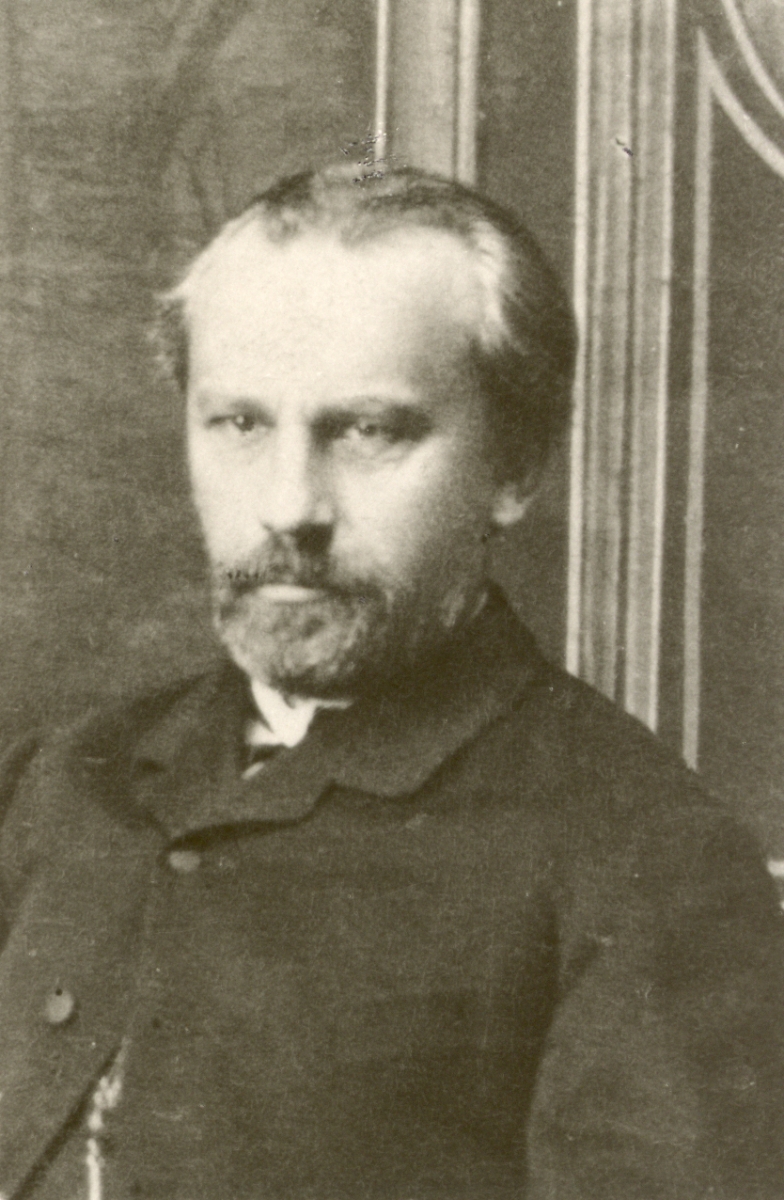
Friedrich Kuhlbars
Friedrich Kuhlbahrs (17. VIII 1843 – 28. I 1924) was a poet, one of the most important representatives of 19th-century Estonian national romantic lyrics and early children’s poetry. Some of his poems are still well known today as lyrics for choirs and popular songs.
Friedrich Karl Johann Kuhlbars was born in the Sangaste parish (kihelkond) of Tartu County, educated at schools in Tartu, and trained as a teacher at Tartu German Pedagogical College from 1859–1861. For 33 years (1862–1895) he worked at the German language primary school for boys in Viljandi, first as a teacher and then as headmaster. He was a respected educator under whose tutelage a succession of Estonian public figures and writers got their education and Estonian national mindset. As tsarist russification policies intensified, he had to leave his job in 1895. Kuhlbars spent the latter period of his life as an independent man of letters, devoting himself to the study of ancient Estonian heroes and place names while continuing to write poetry. He died in Viljandi in 1924.
Kuhlbars’ interest in literature developed early. While studying in Tartu he read in German the works of authors from Germany and other countries. His own work with its ancient romantic tinge was for the most part influenced by German late romantic poetry and classical literature. In addition to this, the works of two great Estonian predecessors played a defining role: the mythical fairytales in German of Friedrich Robert Faehlmann and the epic poem Kalevipoeg by Friedrich Reinhold Kreutzwald.
Kuhlbars’ earlier works, published in the 1860s–70s, are of greater literary and cultural import. Although his debut collection in the South-Estonian dialect, Vastse laulo ja kannel (‘New Songs and a Harp’, 1863), was undeservedly overlooked, his next two collections (of songs published with musical notation and lyrics) drew popular acclaim. These were Laulik koolis ja kodus (‘A Song Book for School and Home’, 1868) and Vanemuine ehk neljakordne laululõng (‘Vanemuine or Four-Ply Song Yarn’, 1870). Both works, especially the latter, contain Kuhlbars’ best known song lyrics, including the popular Vanemuine (with its opening line “Kui Kungla rahvas kuldsel a’al” / “When the Kungla folk of the golden age”). For some time after 1870 his work tended to appear in the press and in thematic albums, and he was gradually overshadowed by other poets who had emerged at the time of national awakening. He compiled and published collections of songs for school children in separate volumes, one of them in Russian. He also wrote and published two collections of poems in German. In his later years, he compiled a sizeable volume of selected poems, Luuletused (‘Poems’), consisting primarily of poems which had not appeared in earlier collections. It was published in 1922–1924 under the pseudonym Villi Andi, which Kuhlbars had used earlier.
A large part of Kuhlbars’ poetry is songlike, many texts having been written with particular melodies (initially mostly German) in mind. These texts are pleasing to the ear, flowing, and for the most part simple in form. He also has other more prose-like poems, which are more complex in expression and more diverse in form. The tone of Kuhlbars’ poetry is predominantly optimistic, even celebratory, expressive of the moods of the rise of the national awakening. One thematically distinctive set consists of mythology-inspired patriotic songs, with motifs derived from the ancient times of freedom and heroes. Other recurrent themes are home, homesickness, nature and love; in the case of the latter, Kuhlbars is for the most part impersonal, abstract and lofty. The best of his children’s poems retain a genuinely childlike air and wording.
E. S. (Translated by M. M.-K.)
Books in Estonian
Poems
Wastse laulo ja kannel. Tartu: 1863, 75 lk.
Laulik koolis ja kodus. Ued laulud ühe, kahe, kolme ja nelja healega ja kaanonid: noorele ja wanale, iseäranis Eesti koolidelle. Tartu: 1868, 48 lk.
Wanemuine ehk Neljakordne Laulu-Lõng: laulud meeste-koorile. Tartu: H. Laakmann, 1870, 28 lk.
Laste laulik. Jurjev: 1899, 78 lk.
Kooli kannel: 176 ühe-, kahe-, kolme- ning neljahäälelist laulu Eesti koolidele, ühtlasi ka laste-aedadele ning kodulastele. Viljandi: 1908.
Jõulu pähkled ja teised luuletused: noorele ning wanale. Viljandi: H. Leoke, 1910, 54 lk.
Villi Andi, Kannel ning mõõk. Luuletused Eesti elus ülitähtsa 1919. a. mälestuseks. Viljandi: 1919, 16 lk.
Villi Andi, Luuletused. Esimene osa ehk Perekonna-raamat. Tallinn: Rahvaülikool, 1922, 112 lk.
Villi Andi, Luuletused. II osa: Isamaa-raamat. Tallinn: Rahvaülikool, 1923, 112 lk.
Villi Andi, Luuletused. III-IV osa: Sõja- ning Rahu-raamat. Tallinn: Rahvaülikool, 1924, 74 lk.
Non-fiction
Villi Andi, Kes on Kalevipoeg, Suur-Tõll ja nende kaastegelased?. Viljandi: H. Leoke, 1911.



